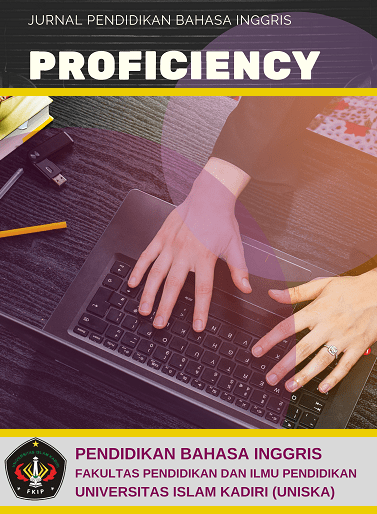SPOTIFY APPLICATION ON THE STUDENTS’ VOCABULARY ACHIEVEMENT: AN EXPERIMENTAL STUDY
Abstract
The study investigated the influence of the Spotify application on the vocabulary achievement of eleventh-grade students. The research identified the need for engaging methods to enhance vocabulary learning, as non-technology media approaches often failed to captivate students. Spotify’s audio media features, such as songs and lyrics, offered contextual and interactive learning opportunities. Previous studies and the theoretical framework suggested that digital platforms like Spotify could significantly influence students’ vocabulary acquisition by presenting language in dynamic and authentic contexts. This study took a quantitative approach, using a pretest and posttest experimental research design that involved 80 students divided into experimental and control groups. The experimental group used Spotify for vocabulary exercises, including listening to curated songs, analyzing lyrics, and completing interactive tasks, while the control group received conventional lessons. Data analysis through IBM SPSS 19 assessed vocabulary improvements between the two groups, highlighting Spotify’s pedagogical advantages in creating engaging and effective language-learning environments. The results confirmed the alternative hypothesis (Hₐ), indicating that Spotify enhanced vocabulary achievement. The null hypothesis (H₀), which assumed no significant difference, was rejected. The results confirmed that Spotify enhanced vocabulary achievement. This suggested that integrating Spotify into language instruction not only influenced vocabulary retention but also fostered motivation and engagement among students, marking it as an effective educational tool.
References
Andanty, F. D., Setiawan, R., Agustina, E., Susanto, F., Soelistijowati, J. O., & Sukma Dewi, A. (2024). Vocabularies in Context (Vontext): Sebuah Levitasi Teknik Pengajaran Bagi Guru Bahasa Inggris Sekolah Dasar. Pancasona, 3(1), 49–64. https://doi.org/10.36456/pancasona.v3i1.8708
Aulia, M. N. (2019). The Use of Nursery Rhymes to Improve the Eighth Grade Students’ Vocabulary Achievement and Active Participation. In Doctoral dissertation, Fakultas Keguruan Dan Ilmu Pendidikan Universitas Jember. Universitas Jember.
Butar Butar, E. L., & Katemba, C. V. (2023). EFL Students’ Perceptions Toward Vocabulary Learning by Listening to English Songs on Spotify. Journey: Journal of English Language and Pedagogy, 6(1), 194–205. https://doi.org/10.33503/journey.v6i1.2685
Creswell, J. W., & Creswell, J. D. (2018). Research Design: Qualitative, Quantitave, and Mixed Methods Approaches (5th ed., Vol. 4, Issue 1). SAGE Publications.
Hasanah, M., & Suryanto, B. T. (2024). Students’ View on Using Spotify Application to Vocabulary Mastery. English Language Teaching Journal, 4(1), 25–31.
Lestari, I. W., & Hardiyanti, N. (2020). Vocabulary Learning Autonomy through Incorporation of English Songs: Indonesian EFL Students’ Perspectives. 3L: Language, Linguistics, Literature, 26(2), 94–104. https://doi.org/10.17576/3L-2020-2602-07
Mamaghe, N., Rombepajung, P., & Hampp, P. (2021). Improving Students ’ Mastery of Vocabulary through the Use of Glossing Technique. JELT (Journal of English Language and Literature Teaching), 06(01), 36–44.
Mishra, P., Pandey, C. M., Singh, U., Gupta, A., Sahu, C., & Keshri, A. (2019). Descriptive Statistics and Normality Tests for Statistical Data. Annals of Cardiac Anaesthesia, 22(1), 67–72. https://doi.org/10.4103/aca.ACA_157_18
Namaziandost, E., & Nasri, M. (2019). The Impact of Social Media on EFL Learners’ Speaking Skill: A Survey Study Involving EFL Teachers and Students. Journal of Applied Linguistics and Language Research, 6(3), 199–215. https://www.researchgate.net/profile/Ehsan-Namaziandost/publication/334823964_The_Impact_of_Social_Media_on_EFL_Learners’_Speaking_Skill_A_Survey_Study_Involving_EFL_Teachers_and_Students/links/5d49997ba6fdcc370a80c09a/The-Impact-of-Social-Media-on-EFL-Le
Oktaviana, I., Hidaya, N., & K, F. H. (2023). The Use of Olivia Rodrigo’s Songs on the Spotify Application to Improve Vocabulary Mastery for Ninth-Grade Students at SMPN 1 Rowosari. Didaktik : Jurnal Ilmiah PGSD STKIP Subang, 9(5), 379–387.
Putri, A. W. K., & Rustipa, K. (2023). Using Songs to Teach English Vocabulary to Young Learners in Kindergarten. Edunesia: Jurnal Ilmiah Pendidikan, 4(3), 1017–1030. https://doi.org/10.51276/edu.v4i3.485
Rahayu, E. M., & Bhaskoro, P. (2022). Interactive Media Edpuzzle and Its Implementation in Teaching Vocabulary in New Normal Era. Jo-ELT (Journal of English Language Teaching) Fakultas Pendidikan Bahasa & Seni Prodi Pendidikan Bahasa Inggris IKIP, 9(1), 1–12. https://doi.org/10.33394/jo-elt.v9i1.4425
Rohmah, N., & Indah, R. N. (2021). The Use of Modified English Song To Improve Vocabulary. Journal of English Language Teaching, 9(2), 121–129. http://www.e-journal.stkipsiliwangi.ac.id/index.php/eltin/article/view/2537
Saibauthong, N., & Yimwilai, S. (2022). The Effects of Nursery Rhymes on EFL Learners’ Vocabulary Knowledge [Srinakharinwirot University]. In Doctoral dissertation, Srinakharinwirot University. http://ir-ithesis.swu.ac.th/dspace/handle/123456789/1660
Septiara, A. I., & Hamzah, I. (2023). Students’ Perception of the Use of Spotify Application to Improve Students’ Vocabulary Mastery. Journal of English Language Teaching and Learning (JELTL), 4(1), 14–18. http://jim.teknokrat.ac.id/index.php/english-language-teaching/index
Setiowati, V., Asmarani, R., & Yulianto, B. (2020). The Effectiveness of Audio Media on Learning Outcomes to Understand the Intrinsic Elements of Fairy Tales. Jurnal Ilmiah Sekolah Dasar, 4(4), 636–641.
Shafwati, D., Munifatullah, F., & Nurdiana, N. (2023). The Effect of Spotify Application on Students’ Speaking Ability. PROCEEDING AISELT (Annual International Seminar on English Language Teaching), 8(1), 50–60.
Simamora, S. P., Tampubolon, S., & Sitorus, N. (2023). The Effect of Using Spotify Playlist Application into Student’s Vocabulary Mastery at SMP Negeri 10 Medan. INNOVATIVE: Journal Of Social Science Research, 3(5), 5327–5338.
Suntusia, Dafik, & Hobri. (2019). The Effectiveness of Research Based Learning in improving Students’ Achievement in Solving Two-Dimensional Arithmetic Sequence Problems. International Journal of Instruction, 12(1), 17–32. https://doi.org/10.29333/iji.2019.1212a
Wahyuniar, Uspayanti, R., Sari, H., & Natalia, S. P. (2021). Audio Media to Improve Listening Skill. MUJOLALI: Musamus Journal of Language and Literature, 3(2), 44–50.
Wulansari, I. S., & Dian, F. (2020). The Use of Nursery Rhyme in Teaching Listening Skill to The Seventh Grade Students of SMPN 1 Leuwimunding. Voice of English Learners, 1(1).
































